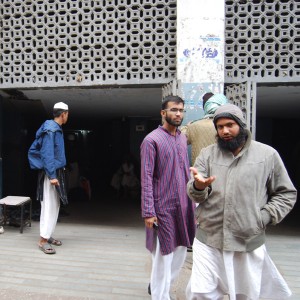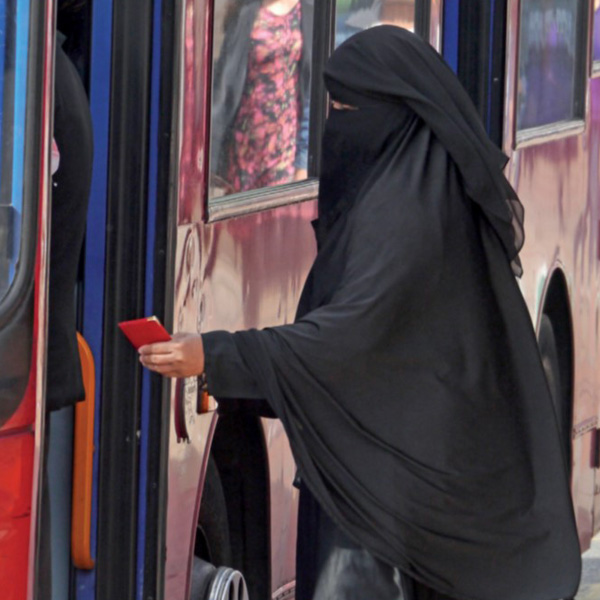The Tablighi Jamaat (TJ) is the most successful of the many neo-fundamentalist groups to form after the Indian Mutiny (or Uprising) in 1857—the Deobandis and Barelwis being the foremost—and yet very few Christians even know about them.
Eighty-million strong today and established in 150 countries from Bangladesh to Kenya to Eire, the reasons for their obscurity highlight the parlous state of Islam awareness among Westerners. Their very hiddenness should challenge our hearts, and their obvious spiritual hunger should be a reproach to mission thinkers.
They have for 20 years been trying to establish a ‘mega mosque’, Europe’s premier Muslim training centre, next to the Olympic Park in Newham, east London. On 29 October, it was finally announced that their three appeals to the Secretary of State against the refusal of planning permission for it had been turned down.
However, they are only ever referred to in newspaper stories of jihadis or terror plotters who may have attended one of their mosques.
Origins
Their methodology, which has been adopted by all London’s mosques, has proven surprisingly effective and resilient since the early 1920s when it was devised by the founder Mohammed Ilyas Khandalawi (1885-1944) to win backslidden Muslims in Mewat, southwest Delhi, back into the fold.
Ilyas was concerned that Muslims were ‘Hinduizing’. This mattered particularly once the British adopted a system of political representation according to religious allegiance. It became politically imperative to consolidate the faiths.
Ilyas set about teaching observance and encouraging mosque attendance. He saw British rule as indicative of Islam’s decay. Ilyas believed reinvigorated religious practice would usher in the eventual establishment of a society based on the sharia. All Muslims believe this to some extent, but TJ takes it further in their espousal of a method of pietism that they believe is foolproof.
Strict observance and preaching
The solution was for Muslims to turn to a strict implementation of the faith, even to using a twig for a toothbrush, as Mohammed is said to have done. It is not enough simply to be Muslim in name, but every action including dress and interaction with others should conform to a six-point rule (over and above the five pillars of Islam) and the prescriptions contained within set literature that all devotees must read.
There is also a requirement to go on ‘preaching tours’ around the country and abroad—reflected in TJ’s name. These can be up to 40 days long, require sleeping on mosque floors, giving up work, and bonding deeply with fellow pilgrims.
This vast group learns thereby to shun the harsh outside world wherever it has established itself. The resulting atmosphere of spirituality, solidarity, and purpose proves compelling, especially to the young.
Low profile
Adherents do not proselytise non-Muslims. They want only to revive the faith of weaker Muslims, and thus help to ensure either a passport to paradise, or the rule of Islam on earth, whichever comes soonest.

In both aspects, they are a particular challenge to Christians, most of whom have never heard of them, though we have all undoubtedly encountered them. When on the several occasions the author has asked a roomful of Anglican clergy and Muslim religious leaders who has heard of the TJ, none of the Christians ever puts up their hand, but all the Muslims do.
Referred to humorously by the prominent British Muslim intellectual Ziauddin Sardar, who writes of being evangelised by them, as ‘ninja turtles’ for the all-enveloping ‘black sheet’ the women are required to wear, they are conflated with Salafis or Wahhabis—both of which categories are wrong.
Isolation
Part of the problem is that TJ themselves never constitute themselves into formal ‘trusts’ or ‘companies’ and shun political, legal, or social engagement with the wider world. There are—intentionally—few formal points of contact at all.
TJ will not engage politically, unless it is in their immediate interests, such as getting a huge mosque built, when proxies act for them in relation to planning and public relations. Indeed two Muslim witnesses to the Planning Inquiry against the mega mosque development in Newham last year withdrew their evidence the night before, one privately telling a party to the inquiry that she had been intimidated.
Although they and their apologists make a great virtue of their apolitical other-worldliness, they can be very determined indeed to establish a niche for themselves. This is particularly so in Britain. Indeed the international amir is said to have taken Hafiz Muhammad Ishaq Patel, Britain’s first amir, in front of the Kaaba in Mecca ‘and there offered supplications to Allah to make him the instrument of winning the whole of Britain to Islam’.[1]
Western politeness about religion, and the cult-like nature of the group further inure them from notice. Muslim scholars note their inability to compete with the harsh ungodly world they perceive around them, and that they make a virtue of a necessity, re-creating and divinising their own unreality.
It ‘begins and operates in cultic fashion’, writes Sardar, referring to the recruitment, bonding, and re-socialising processes that a follower of TJ undergoes.[2] Sardar himself, quickly disillusioned, notes that they have condensed the requirements of the faith into an all-encompassing six points and ‘God will take care of the rest’. Those six points act as a perimeter fence on both the experience and the critical faculties of the devotee. They include ‘respect for Muslims’—but not for non-Muslims.
Misunderstood fundamentalism
The TJ brand of fundamentalism is also misconstrued. It is not ‘ultra-orthodox’ as Sean O’Neill, Security Correspondent of The Times writes—in fact rather the opposite.[3] Ghayasuddin Siddiqui, founder of the Muslim Institute and godfather of the world’s first Muslim counter-terror think tank, Quilliam Foundation, is against the ‘mega mosque’ because, as he told the author, he believes they peddle ‘fairy tales’.
It is precisely their unorthodoxy that causes deep fissures in the Muslim world. The first petition against the mega mosque was started by a Muslim.
Their reliance on unorthodox stories of mythical heroes, their other-worldliness and pietism, their veneration for the founder and his family, and their ritualisation of certain select scriptures and practices has led one scholar to conclude that they function like a huge Sufi order, something that the ultra-orthodox completely condemn.[4]
Infiltration
Such pietism can frustrate young zealots who are vulnerable to the shadowy jihadi-groomers who infiltrate their ranks, say some.
The Pakistani secret service (ISI) actively recruited for its Kashmir campaigns among TJ. TJ has one of the world’s largest ijtima or religious gatherings at its base in Raiwind, outside Lahore.[5] The French secret service allegedly regards them as a driving force for radicalization.[6]
Bangladesh hosts its own annual gathering at Tongi outside Dhaka which is also larger even than the hajj in Mecca—though no one seems aware of it—and is another place where according to Sikand, cover is provided by default to those Muslims who have a more lethal agenda.[7]
TJ has harboured terrorists in Britain too—Richard Reid the ‘shoe bomber’ attended TJ mosques, as have many others. However, this does not mean that TJ itself is a hotbed of terrorism; indeed this accusation is vehemently denied by its supporters.[8] It does mean that TJ creates a form of social vacuum that has proven disorientating for young Muslims who have already failed to engage with wider society.
Women
Their neo-fundamentalist orientation means that women in particular remain locked into a medieval system of patronage that results in illiteracy and disaffection. Mewat’s female literacy rate, where the movement began, is just 5% today.[9]
For the author’s interview with TJ elders at their headquarters in Nizamuddin, Old Delhi, she was required to sit with her back to them. Women still live in zenanas (harems) and are normally forbidden even in Britain from leaving the house unaccompanied by a male. Marriages are conducted in their name, not in their presence.
Implications and responses
Christians in particular need to acknowledge the spiritual hunger of a people out of love with the world, yearning for spiritual consolations, and sometimes a more heroic role.
Some Christian projects are alert to this. The Springfield Project—a children’s centre and outreach work in Birmingham opened by the Archbishop of Canterbury—works on the basis that a lack of self-esteem among generationally disorientated young Muslims is rooted in a lack of love. Angie King, Project Director, says that ‘extremism fills the vacuum that is left when people are not integrated from a young age into a caring environment that identifies them clearly as a wanted part of the whole community.’[10]
Yet TJ provides just this sense of ‘community’, rendered more impenetrable by its sense of social superiority.
Dr Taj Hargey, an imam in Oxford who is persona non grata for criticizing TJ publicly, says of them: ‘They encourage Muslims already disenchanted with life in the West . . . to disassociate from the world by pursuing a trans-national, self-imagined construct that can be exploited by extremists.’ ‘They are’, he adds, ‘scornful of secular democracy and Western values’ and espouse ‘voluntary apartheid as not merely beneficial, but crucial.’[11]
Where the secularizing world fails is where TJ wins. One young Muslim responding to a blog post on the author’s website about TJ says: ‘TJ is the best thing that ever happened to me.’
Mission thinkers need to understand why that should be so. And that means actively reaching out to TJ Muslims with our own radical critique of a fallen world.
The Anglican Bishop of Pontefract Tony Robinson has managed to do it, in the town that accommodates TJ’s European headquarters, Dewsbury. Building on his own spiritual prestige, and the respect accorded by Muslims to religious authority, he founded the Kirklees Faiths Forum in 2009. A Muslim-led project that encourages partnership between Muslims in his diocese and those in Faisalabad, north Pakistan, it was a response to the attack on the Christian village of Gojra in 2009 in which eight people were burned alive.
Says Dr Ishmael Sezgin of the Dialogue Society: ‘It’s a beacon—it’s not appreciated. The work they do, the fact you have a Bishop as the head—the ability to bring very respected scholars together with a Bishop in one charity. It’s amazing. The Bishop is too modest!’[12]
‘This is the groundwork’, says the Bishop, laughing off the praise. ‘You start off with tea and samosas—you have to. But then you build on that.’[13]
The model, which decisively ends isolation and encourages practical activity in partnership, is surely replicable around the world.
Endnotes
- Three scholars attest to this. See Zacharias Pieri, Tablighi Jamaat (Lapido Media, 2012), 29.
- Ziauddin Sardar, Desperately Seeking Paradise: Journeys of a Sceptical Muslim (Granta UK, 2004), 10.
- Sean O’Neill, ‘Sect hires PR firm to win support for giant mosque’, The Times, 21 May 2007, http://www.thetimes.co.uk/tto/faith/article2098358.ece.
- Dietrich Reetz, ‘Keeping busy on the path of Allah: the self-organisation (intizam) of the Tablighi Jamaat’, in D Bredi, ed, Islam in Contemporary South Asia (Rome: Oriente Moderno, 2004).
- Yoginder Sikand, The Origins and Development of the Tablighi Jamaat (1920-2000): A Comparative Study (Hyderabad: Orient Longman, 2002).
- Pieri, Tablighi Jamaat, 61.
- Sikand, ibid.
- Pieri, Tablighi Jamaat, 63.
- This and other facts can be found in Zacharias Pieri, Tablighi Jamaat (Lapido Media), available from Amazon in paperback or Kindle at http://www.amazon.co.uk/Tablighi-Jamaat-Handy-Religion-Affairs-ebook/dp/B00KGKEI0M/ref=sr_1_1?s=books&ie=UTF8&qid=1438685449&sr=1-1&keywords=tablighi+jamaat+kindle.
- Jenny Taylor, ‘Seeing off the extremists with love’, Lapido Media, 5 December 2007, www.lapidomedia.com/seeing-off-the-extremists-with-love.
- Pieri, Tablighi Jamaat, 40f.
- Jenny Taylor, ‘British Muslim businesses partner Christians to tackle persecution’, Lapido Media, 6 May 2015, http://www.lapidomedia.com/british-muslim-business-partner-christians-tackle-persecution.
- Outcomes of this project are discussed at http://www.lapidomedia.com/british-muslim-business-partner-christians-tackle-persecution.
* Editor’s Note: Featured image (woman and bus) is used with permission from Jeremy Hunter. www.jeremyhunter.com.

